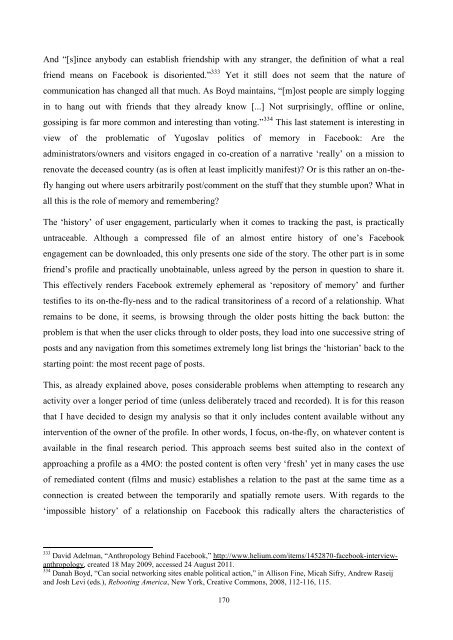UNIVERSITY OF NOVA GORICA GRADUATE SCHOOL ...
UNIVERSITY OF NOVA GORICA GRADUATE SCHOOL ...
UNIVERSITY OF NOVA GORICA GRADUATE SCHOOL ...
You also want an ePaper? Increase the reach of your titles
YUMPU automatically turns print PDFs into web optimized ePapers that Google loves.
And ―[s]ince anybody can establish friendship with any stranger, the definition of what a real<br />
friend means on Facebook is disoriented.‖ 333 Yet it still does not seem that the nature of<br />
communication has changed all that much. As Boyd maintains, ―[m]ost people are simply logging<br />
in to hang out with friends that they already know [...] Not surprisingly, offline or online,<br />
gossiping is far more common and interesting than voting.‖ 334 This last statement is interesting in<br />
view of the problematic of Yugoslav politics of memory in Facebook: Are the<br />
administrators/owners and visitors engaged in co-creation of a narrative ‗really‘ on a mission to<br />
renovate the deceased country (as is often at least implicitly manifest)? Or is this rather an on-thefly<br />
hanging out where users arbitrarily post/comment on the stuff that they stumble upon? What in<br />
all this is the role of memory and remembering?<br />
The ‗history‘ of user engagement, particularly when it comes to tracking the past, is practically<br />
untraceable. Although a compressed file of an almost entire history of one‘s Facebook<br />
engagement can be downloaded, this only presents one side of the story. The other part is in some<br />
friend‘s profile and practically unobtainable, unless agreed by the person in question to share it.<br />
This effectively renders Facebook extremely ephemeral as ‗repository of memory‘ and further<br />
testifies to its on-the-fly-ness and to the radical transitoriness of a record of a relationship. What<br />
remains to be done, it seems, is browsing through the older posts hitting the back button: the<br />
problem is that when the user clicks through to older posts, they load into one successive string of<br />
posts and any navigation from this sometimes extremely long list brings the ‗historian‘ back to the<br />
starting point: the most recent page of posts.<br />
This, as already explained above, poses considerable problems when attempting to research any<br />
activity over a longer period of time (unless deliberately traced and recorded). It is for this reason<br />
that I have decided to design my analysis so that it only includes content available without any<br />
intervention of the owner of the profile. In other words, I focus, on-the-fly, on whatever content is<br />
available in the final research period. This approach seems best suited also in the context of<br />
approaching a profile as a 4MO: the posted content is often very ‗fresh‘ yet in many cases the use<br />
of remediated content (films and music) establishes a relation to the past at the same time as a<br />
connection is created between the temporarily and spatially remote users. With regards to the<br />
‗impossible history‘ of a relationship on Facebook this radically alters the characteristics of<br />
333 David Adelman, ―Anthropology Behind Facebook,‖ http://www.helium.com/items/1452870-facebook-interviewanthropology,<br />
created 18 May 2009, accessed 24 August 2011.<br />
334 Danah Boyd, ―Can social networking sites enable political action,‖ in Allison Fine, Micah Sifry, Andrew Raseij<br />
and Josh Levi (eds.), Rebooting America, New York, Creative Commons, 2008, 112-116, 115.<br />
170

















